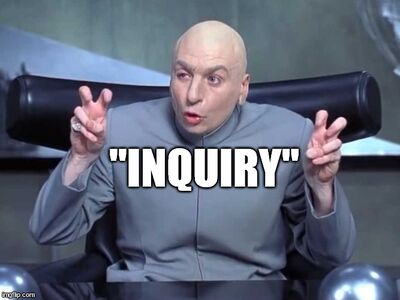Difference between revisions of "Inquiry"
(Unstub) |
(UK Inquiries Act 2005 + image) |
||
| Line 2: | Line 2: | ||
|description=Cooling out perception management operations to "tell stories and [[sell narratives]]. They tie up the loose ends and weave a pretense of accountability." | |description=Cooling out perception management operations to "tell stories and [[sell narratives]]. They tie up the loose ends and weave a pretense of accountability." | ||
|wikipedia=https://en.wikipedia.org/wiki/Public_inquiry | |wikipedia=https://en.wikipedia.org/wiki/Public_inquiry | ||
| + | |image=Inquiry.jpeg | ||
| + | |image_width=400px | ||
|constitutes=perception management | |constitutes=perception management | ||
}}{{SMWQ | }}{{SMWQ | ||
| Line 21: | Line 23: | ||
=== Standard operating procedure violations === | === Standard operating procedure violations === | ||
A ''lot'' of effort is put into public inquiries about sensitive [[deep events]], especially [[structural deep events]]. They regularly violate standard operating procedure in subtle but very important ways. For example, testimony may not be under oath, or particular witnesses may not be invited to testify etc. These violations are either not mentioned or excuse on some pretext. | A ''lot'' of effort is put into public inquiries about sensitive [[deep events]], especially [[structural deep events]]. They regularly violate standard operating procedure in subtle but very important ways. For example, testimony may not be under oath, or particular witnesses may not be invited to testify etc. These violations are either not mentioned or excuse on some pretext. | ||
| + | |||
| + | ==UK Inquiries Act 2005== | ||
| + | Under the 2005 Act the UK government establishes the inquiry, it sets the terms of reference for the inquiry and can change them whenever it likes; the government appoints the chair of the inquiry and the chair appoints the inquiry panel (counsel), as long as the government agrees; if the members don't toe the line, the government can dismiss and re-appoint a new chair and/or the panel whenever it chooses; the government can determine which witnesses are called, it can withhold funding for areas of "investigation" it doesn't like the look of; the government can shut down the inquiry if it is starting get a bit too close to the mark, and the government has carte blanche to approve, amend and redact the final inquiry report prior to publication.<ref>https://www.ncbi.nlm.nih.gov/pmc/articles/PMC558635/</ref> | ||
| + | |||
{{SMWDocs}} | {{SMWDocs}} | ||
Latest revision as of 11:04, 11 December 2023
(perception management) | |
|---|---|
 | |
| Cooling out perception management operations to "tell stories and sell narratives. They tie up the loose ends and weave a pretense of accountability." |
“[Inquiries] tell stories and sell narratives. They tie up the loose ends and weave a pretense of accountability. They rewrite history amid a theatrically contrived display of faux-cathartic self-examination which, in the end, only supports the mainstream narrative.”
Kit Knightly (5 November 2023) [1]
Public inquiries are regularly held after events which displease the public. Ostensibly efforts to uncover what happened, some are probably exactly that, but nowadays they are generally -- especially when held about deep events -- exactly the opposite, i.e. efforts to hide the truth by promoting a falsified official narrative (or official opposition narrative).
Contents
Procedure
Running a public inquiry is an important job which must be entrusted to a safe pair of hands, preferably one with experience at running an inquiry. The result of this is that a small number of deep state cover-up artists are repeatedly selected.
Standard operating procedure violations
A lot of effort is put into public inquiries about sensitive deep events, especially structural deep events. They regularly violate standard operating procedure in subtle but very important ways. For example, testimony may not be under oath, or particular witnesses may not be invited to testify etc. These violations are either not mentioned or excuse on some pretext.
UK Inquiries Act 2005
Under the 2005 Act the UK government establishes the inquiry, it sets the terms of reference for the inquiry and can change them whenever it likes; the government appoints the chair of the inquiry and the chair appoints the inquiry panel (counsel), as long as the government agrees; if the members don't toe the line, the government can dismiss and re-appoint a new chair and/or the panel whenever it chooses; the government can determine which witnesses are called, it can withhold funding for areas of "investigation" it doesn't like the look of; the government can shut down the inquiry if it is starting get a bit too close to the mark, and the government has carte blanche to approve, amend and redact the final inquiry report prior to publication.[2]
Examples
| Page name | Description |
|---|---|
| Cory Collusion Inquiry | |
| David Kelly/Assassination/Hutton Inquiry | |
| Iraq Inquiry | "The point of the delay is to give the impression Chilcot has been absolutely painstaking and therefore the bucket of whitewash he will throw cannot be hiding anything. Do not be fooled." (Craig Murray) |
| Kovalev commission | An ill-fated commission to investigate the 1999 Russian Apartment bombings. Various members of it were assassinated or died after suspicious accidents. |
| Leveson Inquiry | Investigation of phone hacking |
| Macpherson Inquiry | Relating to the murder of Stephen Lawrence |
| Pan Am Flight 103/Fatal Accident Inquiry | The only public hearing in Scotland of the facts about the Lockerbie bombing. |
| Saville Inquiry | An investigation into Bloody Sunday which left 14 people dead. |
Official examples
| Name |
|---|
| Al-Sweady Inquiry |
| COVID-19/Public Inquiry |